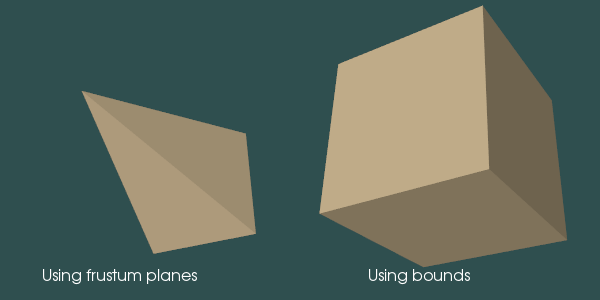Planes
Repository source: Planes
Other languages
See (Python), (PythonicAPI), (CSharp)
Question
If you have a question about this example, please use the VTK Discourse Forum
Code¶
Planes.cxx
#include <vtkActor.h>
#include <vtkActor2D.h>
#include <vtkCamera.h>
#include <vtkHull.h>
#include <vtkNamedColors.h>
#include <vtkNew.h>
#include <vtkPlanes.h>
#include <vtkPolyData.h>
#include <vtkPolyDataMapper.h>
#include <vtkProperty.h>
#include <vtkRenderWindow.h>
#include <vtkRenderWindowInteractor.h>
#include <vtkRenderer.h>
#include <vtkSmartPointer.h>
#include <vtkSphereSource.h>
#include <vtkTextMapper.h>
#include <vtkTextProperty.h>
#include <string>
#include <vector>
int main(int, char*[])
{
vtkNew<vtkNamedColors> colors;
// These are the two methods we will use.
std::vector<std::string> titles{"Using frustum planes", "Using bounds"};
std::vector<vtkSmartPointer<vtkPlanes>> planes;
for (auto i = 0; i < titles.size(); ++i)
{
planes.push_back(vtkSmartPointer<vtkPlanes>::New());
}
// Using frustum planes.
vtkNew<vtkCamera> camera;
double planesArray[24];
camera->GetFrustumPlanes(1, planesArray);
planes[0]->SetFrustumPlanes(planesArray);
// Using bounds.
vtkNew<vtkSphereSource> sphereSource;
sphereSource->Update();
double bounds[6];
sphereSource->GetOutput()->GetBounds(bounds);
planes[1]->SetBounds(bounds);
// At this point we have the planes created by both of the methods above.
// You can do whatever you want with them.
// For visualisation we will produce an n-sided convex hull
// and visualise it.
// Create a common text property.
vtkNew<vtkTextProperty> textProperty;
textProperty->SetFontSize(16);
textProperty->SetJustificationToCentered();
// Create the render window and interactor.
vtkNew<vtkRenderWindow> renWin;
renWin->SetWindowName("Planes");
vtkNew<vtkRenderWindowInteractor> iRen;
iRen->SetRenderWindow(renWin);
std::vector<vtkSmartPointer<vtkHull>> hulls;
std::vector<vtkSmartPointer<vtkPolyData>> pds;
std::vector<vtkSmartPointer<vtkPolyDataMapper>> mappers;
std::vector<vtkSmartPointer<vtkActor>> actors;
std::vector<vtkSmartPointer<vtkTextMapper>> textMappers;
std::vector<vtkSmartPointer<vtkActor2D>> textActors;
std::vector<vtkSmartPointer<vtkRenderer>> renderers;
for (auto i = 0; i < titles.size(); ++i)
{
hulls.push_back(vtkSmartPointer<vtkHull>::New());
hulls[i]->SetPlanes(planes[i]);
pds.push_back(vtkSmartPointer<vtkPolyData>::New());
// To generate the convex hull we supply a vtkPolyData object and a bounding
// box.
// We define the bounding box to be where we expect the resulting polyhedron
// to lie.
// Make it a generous fit as it is only used to create the initial
// polygons that are eventually clipped.
hulls[i]->GenerateHull(pds[i], -200, 200, -200, 200, -200, 200);
mappers.push_back(vtkSmartPointer<vtkPolyDataMapper>::New());
mappers[i]->SetInputData(pds[i]);
actors.push_back(vtkSmartPointer<vtkActor>::New());
actors[i]->SetMapper(mappers[i]);
actors[i]->GetProperty()->SetColor(
colors->GetColor3d("Moccasin").GetData());
actors[i]->GetProperty()->SetSpecular(0.8);
actors[i]->GetProperty()->SetSpecularPower(30);
textMappers.push_back(vtkSmartPointer<vtkTextMapper>::New());
textMappers[i]->SetInput(titles[i].c_str());
textMappers[i]->SetTextProperty(textProperty);
textActors.push_back(vtkSmartPointer<vtkActor2D>::New());
textActors[i]->SetMapper(textMappers[i]);
textActors[i]->SetPosition(120, 16);
renderers.push_back(vtkSmartPointer<vtkRenderer>::New());
renderers[i]->AddActor(actors[i]);
renderers[i]->AddViewProp(textActors[i]);
renWin->AddRenderer(renderers[i]);
}
// Setup the viewports
auto xGridDimensions = 2;
auto yGridDimensions = 1;
auto rendererSize = 300;
renWin->SetSize(rendererSize * xGridDimensions,
rendererSize * yGridDimensions);
for (auto row = 0; row < yGridDimensions; ++row)
{
for (auto col = 0; col < xGridDimensions; ++col)
{
auto index = row * xGridDimensions + col;
// (xmin, ymin, xmax, ymax)
double viewport[4] = {
static_cast<double>(col) / xGridDimensions,
static_cast<double>(yGridDimensions - (row + 1)) / yGridDimensions,
static_cast<double>(col + 1) / xGridDimensions,
static_cast<double>(yGridDimensions - row) / yGridDimensions};
if (index > (actors.size() - 1))
{
// Add a renderer even if there is no actor.
// This makes the render window background all the same color.
vtkSmartPointer<vtkRenderer> ren = vtkSmartPointer<vtkRenderer>::New();
ren->SetBackground(colors->GetColor3d("DarkSlateGray").GetData());
ren->SetViewport(viewport);
renWin->AddRenderer(ren);
continue;
}
renderers[index]->SetViewport(viewport);
renderers[index]->SetBackground(
colors->GetColor3d("DarkSlateGray").GetData());
renderers[index]->ResetCamera();
renderers[index]->GetActiveCamera()->Azimuth(30);
renderers[index]->GetActiveCamera()->Elevation(-30);
renderers[index]->ResetCameraClippingRange();
}
}
iRen->Initialize();
renWin->Render();
iRen->Start();
return EXIT_SUCCESS;
}
CMakeLists.txt¶
cmake_minimum_required(VERSION 3.12 FATAL_ERROR)
project(Planes)
find_package(VTK COMPONENTS
CommonColor
CommonCore
CommonDataModel
FiltersCore
FiltersSources
InteractionStyle
RenderingContextOpenGL2
RenderingCore
RenderingFreeType
RenderingGL2PSOpenGL2
RenderingOpenGL2
)
if (NOT VTK_FOUND)
message(FATAL_ERROR "Planes: Unable to find the VTK build folder.")
endif()
# Prevent a "command line is too long" failure in Windows.
set(CMAKE_NINJA_FORCE_RESPONSE_FILE "ON" CACHE BOOL "Force Ninja to use response files.")
add_executable(Planes MACOSX_BUNDLE Planes.cxx )
target_link_libraries(Planes PRIVATE ${VTK_LIBRARIES}
)
# vtk_module_autoinit is needed
vtk_module_autoinit(
TARGETS Planes
MODULES ${VTK_LIBRARIES}
)
Download and Build Planes¶
Click here to download Planes and its CMakeLists.txt file. Once the tarball Planes.tar has been downloaded and extracted,
cd Planes/build
If VTK is installed:
cmake ..
If VTK is not installed but compiled on your system, you will need to specify the path to your VTK build:
cmake -DVTK_DIR:PATH=/home/me/vtk_build ..
Build the project:
make
and run it:
./Planes
WINDOWS USERS
Be sure to add the VTK bin directory to your path. This will resolve the VTK dll's at run time.
